Why Scholars Differ – What is the definition of Shariah and Fiqh (part 1)

Why Scholars Differ
This was the first course I delivered in the UK in 2001, but it is as relevant today as it was then, if not more.
I used to deliver this course over three months at shariah college, so here I am going to condense it and give you an overview.
Why do we need to know why scholars differ?
This is an important topic. Usually we have questions regarding how we pray, and every year, as soon as Ramadan approaches, moon-sighting and moon-fighting begins. Why do we have these differences?
Differences in Legal Rulings
We will cover the differences in legal rulings (fiqh) in the four Sunni schools of thought and what are the reasons behind the differences?
We will not cover differences in aqeedah, which is a big topic in itself.
Part 1: What is shariah and what is fiqh and their characteristics?
Part 2: The origin of the four schools of thought.
Is it possible to have one opinion? Is it even healthy to have one opinion? Can we abolish differences and unify the ummah under one way of understanding? You can judge. I will not dictate to you what to understand.
Preserving the Deen
The Prophet (peace be on him) in the hadith said:
Allah Almighty will send for this ummah in the beginning of every century the one who will renew the deen for this ummah. (Sunan abi Dawood)
Allah the Almighty sends in the beginning of every century for this ummah somebody to renew the matters deen for them (Bayhaqi)
We have some discussion on the definition of century, and there are some differences, (some say 20, others say 30), but the majority agree that a century is a 100 years. It may not be precisely 100 years, but it signifies a long time-frame, after which Allah Almighty will send somebody, which might be a group of people, or different individuals in different places to rejuvenate the deen. We have seen this happen throughout history, from the first century onwards.
Renewing the Deen – Recognising False Claims
The Prophet (peace be on him) said:
The best generation is my generation, then those who come after them, then those who come after them. (Bukhari)
This is an authentic narration and testimony that the best people from the ummah are from the first three generations. So it is not a coincidence that the first three schools of thought and the four imams came in the first three generations.
KEYPOINT: We need to understand that the acceptance that Allah Almighty has given to these schools. Of course we are not saying that they are infallible or masum, (as no one other than the prophets are infallible and have ‘isma), as all humans make mistakes. However overall, these three generations was when we had the establishment of the vast majority of our heritage.
We do not wish to live in the past, but in order to move to the future, we need to understand our heritage.
What is Shariah?
Ever since Bin Laden came onto the scene, shariah has become a familiar word! Yet no one quite knows exactly what shariah is.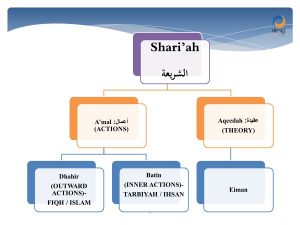
Technical Definition of shariah
Shariah is comprised of two parts: action and theory.
Action
Within action we have the inward and outward actions.
The inward is ihsan, which is explained in the famous hadith Jibril.
Narrated by Abu Huraira:
One day while the Prophet (peace be on him) was sitting in the company of some people, (The angel) Gabriel came and asked, ‘What is faith?’ Allah’s Messenger (peace be on him) replied, ‘Faith is to believe in Allah, His angels, (the) meeting with Him, His Apostles, and to believe in Resurrection.’ Then he further asked, ‘What is Islam?’ Allah’s Messenger (peace be on him) replied, ‘To worship Allah Alone and none else, to offer prayers perfectly to pay the compulsory charity (Zakat) and to observe fasts during the month of Ramadan.’ Then he further asked, ‘What is Ihsan (perfection)?’ Allah’s Messenger (peace be on him) replied, ‘To worship Allah as if you see Him, and if you cannot achieve this state of devotion then you must consider that He is looking at you.’ (Bukhari)
The outward is the practical issues which are regulated by fiqh.
Theory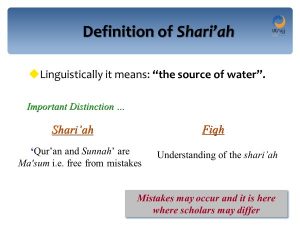
The theory is the aqeedah (belief) and imaan (faith).
The linguistic definition is shariah is from the root sh-ra-aa, a source of water.
Shariah is the body of laws revealed through the Qur’an and Sunnah. It is fixed and unchangeable. They are usually general principles.
Fiqh is the human understanding of shariah. It tends to be specific and demonstrates the application of the basic principles of shariah to given circumstances.
In other words, fiqh is the deduction of Islamic laws from the shariah, and covers situations that were not directly specified in the shariah. This is where mistakes can happen. And also where laws can adapt to accommodate new issues.
We need to understand and distinguish between what is fallible and what is infallible. We should not treat what is infallible as fallible and vice versa. So when we talk about the renewal of the deen, it is not a like a soup, which you put in all the ingredients and blend them together. Instead we have some components you can change and some which you can’t.
There are flexible issues and stable issues. The fixed issues are the foundations and the main principles, for example the inheritance system, which cannot be changed. By contrast, we now have new things like cryptocurrencies. Do we have the rulings to accommodate the new beast? Yes we do. The flexible issues are where we can have ijtihad.
Fiqh
The definition of fi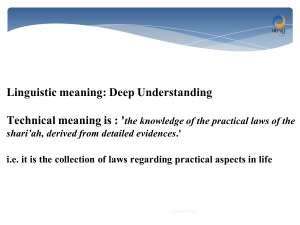 qh comes from the root fa-qa-ha which means deep understanding. Allah Almighty says in the Qur’an so many times, e.g. la alahum yafaqhoon, ‘they do not understand’, so Allah Almighty is referring to using your intellect. We were told:
qh comes from the root fa-qa-ha which means deep understanding. Allah Almighty says in the Qur’an so many times, e.g. la alahum yafaqhoon, ‘they do not understand’, so Allah Almighty is referring to using your intellect. We were told:
Whoever Allah wishes good for, He gives deep understanding of the religion (Bukhari)
Fiqh is the deduction of Islamic laws from the shariah and the person who determines the legal rulings is a faqhi (i.e. jurist/ legal scholar) and the plural is fuqaha.
The Technical Definition of Fiqh
The technical definition of fiqh is very detailed and usually takes 4 hours to explain: ‘The knowledge of the practical laws of the shariah, derived from detailed evidences.’ Basically it means the rules pertaining to practical aspects of life, such as how to perform salah, umrah and hajj, give zakat, carry out transactions, deal with parents etc.
It is not theoretical – they are covered by theology / aqeedah and the spiritual is covered by tarbiyaa (education and upbringing), tazkiyaa (purification) and ihsan (excellence).
The message is three parts – in the middle we have practical aspects, on the right is the theological aspects, and on the left is the spiritual and character building aspects.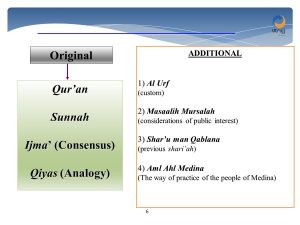
What are the Sources of Fiqh?
How did scholars come up with their opinions? Was it just their own efforts? Or was it based on principles?
Many people might think it was their own efforts and there is nothing to stop them doing the same. For any speciality there are principles which you have to learn. The door is open for those who are qualified and willing to come forward and dedicate time and effort to this speciality.
Agreed Sources
The four main sources are the Qur’an, the Sunnah, Ijma (consensus) and Qiyas (analogy). Even, the non-Sunni schools, such as the Shi’a have the Qur’an and Sunnah, (although they do not call it Sunnah, they call it the narrations of ahlal bayt), and then they have consensus and intellect. Thus across the board these are the accepted sources: no one has any issue with the Qur’an, then you have the Sunnah, Ijma which is the consensus of the scholars of the ummah, (not the consensus of the general public, or like a new referendum on Brexit!).
The two columns are the components that are studied in usool ul fiqh, the principles of fiqh. Usool (basis) is another science in itself, separate from fiqh (knowledge/jurisprudence).
Qiyas is a full science. It can be made by analogy between something that has been mentioned in the Qur’an and Sunnah and something that is new. You compare them and based on that you form a ruling. For example, the prohibition of alcohol is stated clearly in the Qur’an, however nothing is mentioned in the Qur’an specifically about marijuana which some governments want to legalise. As intoxication is the reason behind the prohibition of alcohol, and as drugs are an intoxicant, they have the same ila (reason) so they share the same ruling.
Additional Sources
The additional sources are where discussion and disagreements happen. There are about ten additional practices, of which four are shown on the slide.
The first one is Urf which is the usual custom in the community, such as whether goods are delivered as part of their sale or not, as this varies from country to country. The custom informs the ruling, so in countries where it is the norm to deliver the goods on sale, a judge would rule accordingly. Where it is not the custom, the buyer would have to pay extra for the delivery. Some schools do not rely on custom, others rely heavily on it, such as the Hanafi school.
The second one is Masalah Mursala which is the consideration of public interest. This is mainly adopted by the Maliki school.
There are some rulings based not on Qur’an and Sunnah but on public interest. For instance, in politics, is it the public interest to leave or to stay? If it is in the public interest you decided accordingly.
The third one is Shar’u man Qablana or the earlier shariah, which is a disagreed upon source. The Hanafi adopt this. For example, if we have no ruling in the Qur’an and Sunnah but it was mentioned in the Bible and Torah, and it does not contradict our principles, can we rely on it? It is a point of disagreement, as some schools reject this, but the Hanafi adopt it with limits and conditions.
The fourth source is Aml Ahl Madinah, or the practice of the people of Madinah which Imam Malik considers as a source of rulings, because the majority of the knowledge was disseminated in Madinah so he considered it source that could be relied on. There is more discussion and detail around this.
Later we see the rulings on issues vary depending on the sources the scholars relied on, then the outcome and rulings vary. Not because the deen is different, but the sources used to decide issues was different. This is one of the main reasons for the differences between scholars.
What are the Rulings about learning Fiqh?
There are two types of knowledge – one which everyone needs to know, and the other which is specialised. These are categorised as fard ‘ain and fard kifayah.
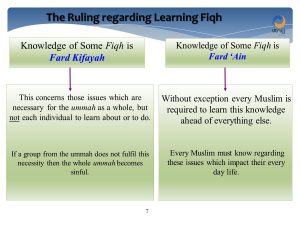
Fard ain is knowledge which every individual should have; you cannot delegate this knowledge to someone else, such as how to pray salah. You cannot ask someone else to perform salah on your behalf, as it is your responsibility. But if there is a janaza in the community, which you could not attend, but someone else in the community did, this is fard kifayah. Not everyone has to perform it, as long as someone does it. But we have no excuse for not knowing fard ain.
If you work in currency exchange, you have to run your business according to shariah, knowing what is halal and haram related to business and riba. It is not an excuse to say you did not know what was halal. Omar (may Allah be pleased with him) would be very stern if he went to the market and found business there who did not know how to run their businesses according to Islamic principles. He would quiz them and if they didn’t pass, he would be angry with them. You have to learn what is relevant to your trade; it is not a luxury. If it is not your business, then it is not incumbent on you to know that. If you are a surgeon, and you leave your patient in the middle of an operation to pray, and he dies, then what kind of Muslim are you?! It would have been better for you to combine your salah.
We need to improve our knowledge and know what is fard ain and what is not.
There are many people suffering because they do not take mortgages and become homeless. You need to know the basics which affect your life – as a spouse, parent, or son/daughter etc.
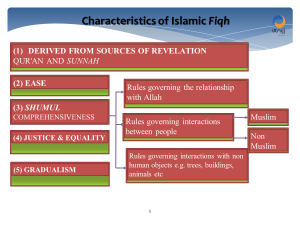 What are the Characteristics of Fiqh?
What are the Characteristics of Fiqh?
Divine
One of the characteristics of Islamic fiqh, briefly, is that it is not human, but divine. Islamic law relies on a divine source – the Qur’an and Sunnah. Both are classified as revelation.
The Qur’an is the recited revelation and in addition, the Sunnah, is considered ‘non-recited revelation’ al wahi ghayru matlu. Though we recite Qur’an in our salah but we do not recite Sunnah in our salah. The Qur’an and Sunnah are the main source of fiqh.
Ease
Another characteristic of fiqh is ease. So forget about the opinions and schools who try to make your life hell but telling you it is better to stick to the toughest, strictest opinions as they are closest to taqwa. The Prophet (peace be on him) in countless authentic narrations, from Bukhari and Muslim would always choose the easiest of two choices as long as it was not a sin. So those who fill your mind with difficulties are making life miserable for no reason.
Comprehensiveness
It covers the minute details of the practical aspects of our life. From medical issues to new inventions such as drones. Are drones halal or haram? It depends what you use them for, if you use them to spy on someone, and invade their privacy, then it is haram. So fiqh tells you what is and isn’t allowed. It covers relationship with people and with Allah Almighty. How to deal with the environment and inanimate objects. The Prophet (peace be on him) cared about the environment, and whenever he sent troops warned them not to chop down trees,, and look after the environment. He urged them to conserve resources, and not to kill birds without the intention that you would eat them 1400 years ago.
Justice and Equality
Islam does not have different rules for different people. The laws are applicable equally to all and there is no class, or race or colour that is superior to anyone else.
Gradualism
Tadaruj or gradualism is seen across the Qur’an and Sunnah, as Allah Almighty brought in changes bit by bit. It is very important. You cannot suddenly make people practice Islam 100% overnight. Change was never brought in over night. There is no such thing as an Islamic revolution, where you wake up one morning and are told you have to practice Islam in an Islamic State, it would only be a disaster. Rather we need to teach people so they can embrace the change at their own pace. This is the virtuous circle in Utrujj, you need to learn and understand, then love it and then live it. We cannot live Islam without learning it, without understanding it or loving it. It does not work like that. We need to educate people and then they will love it and practice it. You don’t need to force it on them. They will do it because they love it.
The prohibition of alcohol did not occur in Makkah, it was much later, in the last three years of the Prophet’s (peace be on him) life that it was enforced, which means it took 20 years for the Muslims to reach that level where they could make such a big change in their lives, and Allah staggered this prohibition for them over four commands. Similarly riba (interest) was one of the last things to be prohibited and this was not done over night, but over four stages, and concluded
Love is not an exclusive property of Valentine’s Day. It is a crucial part of our deen. Love to Allah and His Messenger and to deliver good to people around you. The culture of love is one we shun away from, but we need love in our life. We need to learn how to express our love within limits.
Divisions of Islamic Fiqh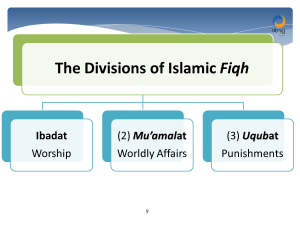
Scholars divided fiqh into three categories: Ibadat (worship, such as salah, siyyam wudu), mumamalat (transactions, sales, contracts) and then uqubat (punishment).
We do not go into punishment because it is for the state, and we do not have any mechanism for punishment without a proper state. The West and non Muslims often want to understand Islam from its punishments – Islam is about chopping hands! This is completely wrong. You cannot take one screw out of a machine and define the machine by it. We are talking about a whole system, which works when it is all applied together. It will not work if you isolate parts of it. So you cannot understand Islam from its punishments. They are a full package, a full system.
The majority of fiqh books talk about ibadat. Perhaps two thirds or 40% of fiqh books and hadith discuss ibadat, and the rest is usually 20-30% about mumalat. If you pose the question, why do we have more on ibadat than mumalat, particularly when ibadat is limited -we don’t have new ibadat but we have new issues all the time, in transactions and worldly affairs? Why do we have for the limited too many, and for the unlimited limited? Because ibadat is prescriptive. You need to know the details of the details. This is called tawqifi (divine). It is prescriptive and has to be done properly.
This is why the Prophet (peace be on him) said:
Pray the way you have seen me pray. (Bukhari)
It is exact. No more, no less.
Whereas mumalat change – times, challenges, needs and circumstances keep changing. So we have principles but only a few details. Allah Almighty wants us to live in ease. If had been restricted for all time, and prescribed 100%, it would have been impossible for us when times changed. It would be too stagnant. So He left it open to change and the perfection of the religion that it is ease within change.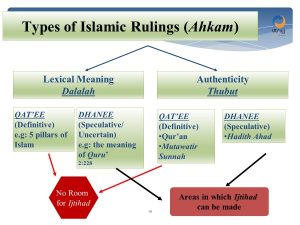
Types of Islamic Ruling
What are these types? We have a system on how scholars decide an issue. We have lexical meanings and authenticity. From a linguistic point of view an ayah or a hadith means something and we look at the context of what the companions understood when these were revealed. So we cannot now create new meanings from the words which is in conflict with how the companions understood it. It was their language and we cannot invent a new understanding. We need to understand the Arabic first, as they understood it.
Dalalah is the meaning. And thubuut is where you received the news from.
Thabuut is the authenticity of the news. Is it fake or reliable?
When we quote something, we quote its source e.g. Bukhari because it reflects the authenticity of the source.
Sometimes authenticity is agreed, but we have a disagreement on the meaning, because the meaning is unclear.
Qatee is a definitive meaning. such as the five pillars of Islam cannot be reinterpreted, for example you couldn’t say that they are the moon and sun.
Dhanee is a speculative meaning. The meaning is not entirely clear, for example, in the Qur’an Allah Almighty says:
And divorced women shall wait (as regards their marriage) for three quru. (2:228)
What is quru? Quru can mean two different things – purity or menstruation. So you can’t say 100% that the meaning of this ayah is referring to purity or menstruation. The text yields multiple possibilities. So we have differences.
The highest level of authenticity is the Qur’an.
Some Sunnah is also classified as the highest level of authenticity. If we have a doubt about authenticity, then we have differences.
When we have a text scholars put it through the lab tests. Is it definitive, or not?
The area of ijitahad can be made in the speculative category. It cannot be made if the meaning or source is definitive. If someone is claiming they are renewing the deen, but they are attacking a definitive area, you can tell that they are ignorant, if they have a good intention. Or they are deliberately corrupting the deen.
So some matters are flexible and some are not.
Divisions of Hadith in Sunnah
We have 27 -30 types of hadith and three main classifications of hadith.
The words or actions of the Prophet can be authentic (sahih) because of the chain of transmitters, some may have a weakness, but be good (hasan), and if there is more weakness it is classified as weak (da’if).
The Qur’an is mutawatir which means it is beyond all doubt. The highest level of authenticity.
Mutawatir means a multitude of people received it and delivered the same message to a multitude of people, so there is no doubt that this a fact. For example, is there a doubt that America exists if you haven’t been there? It is mutatwatir, because although you haven’t seen it, a multitude has told a multitude about its existence.
The highest level within the Sunnah is also mutawatir which means it is like the Qur’an (not THE Qur’an). Not all the Sunnah is mutawatir. Only 313 hadith are mutawatir. The majority of the rest of the Sunnah is classified between sahih and hasan – with some accepted weak narrations with conditions. The rest have been filtered as to what is acceptable from them and what is not.
Don’t misunderstand, if a Sunnah is not mutawatir it does not make it inauthentic.
Hadith Qudsi (also known as hadith rabbani and hadith ilahi) can belong to any category of authenticity- even weak or fabricated, but the difference is that they begin with ‘Allah says..’
There are different types of tafsir: linguistic like Zajaj, Zamakshari Qashaf, as well as tafsir of fiqh, where the scholars go through the hadith and focus on the fiqh issues,. When you read these, it is clear that the differences start in the early generations over certain ayahs. Our late Shaykh Professor Zuhayli (rahim Allah) has written three tafsir books, one which is 15 volumes, Tafsir Muneer, mainly on fiqh issues. We rely on it heavily.
Course delivered by Shaykh Haytham Tamim on 2nd February 2019.
Related Posts
Why Scholars Differ – the Differences between the Schools of Thought
Why Scholars Differ -The Origin of the Four Schools of Thought
Renewing the Deen – Recognising False Claims
Recommended Posts

The truth is more powerful than lies
July 26, 2024

Does a bride’s wali have to be Muslim?
July 25, 2024

